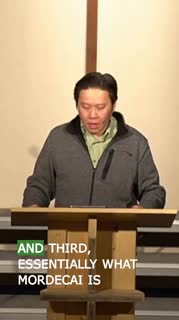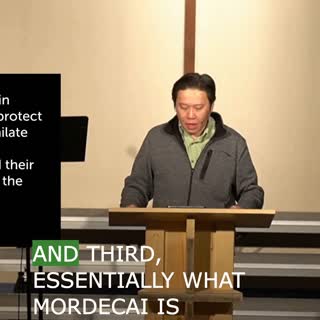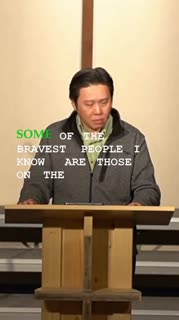Empowered for Defense: Love and Spiritual Readiness
Devotional
Sermon Summary
Sermon Clips
"Now this is, even though Haman is gone, this particular law is still in motion. So today we're going to look at how Esther is going to deal with this, and in order for her to overcome this, or to counteract this, he would need the help of his uncle Mordecai." [00:30:42] (18 seconds)
"So Mordecai now has been promoted to this great place of honor, this great place of power and authority. Again, it was vastly different from just a chapter ago when he was crying and weeping in the king's court. So Esther, again, pleaded with the king, falling at his feet, weeping and begging him to put an end to this evil plan of Haman that was devised against the Jews." [00:32:08] (25 seconds)
"The king saying to Esther, I love you, dear, right? I've given you his house, I've given you his lands, I have killed him, but what I have signed cannot be revoked. So take my ring, write a new law, one that will benefit your people, but make sure that one doesn't override the older one." [00:34:29] (23 seconds)
"Mordecai's edict is of the equal power and force. He says he gives the Jews the power to defend themselves. He says he gives the Jews the power to defend themselves. He says he gives the Jews the power to defend themselves and to kill those who would attack you and in turn plunder their land." [00:35:49] (13 seconds)
"And third, essentially what Mordecai is actually saying, and I'm not going to go into too much detail on this, but I'm going to I'm not quite sure King Xerxes understood this, was essentially he allowed for a civil war to break out in the kingdom. At least for that one day, on the 13th day of the 12th month, a legalized war would break out between the Jews and people of the other nations within the Persian empire." [00:36:41] (24 seconds)
"A couple of weeks ago, we talked about the conflict between Mordecai. Mordecai and Haman started because of resentment in your heart. And the only way to overcome resentment is not fighting, you know, you hit me, I'll hit you back. Hatred doesn't end. Those things will not end. Only love, only love can ultimately end this war and hostility between people." [00:39:59] (22 seconds)
"Pacifists are people who believe that, you know, the teachings of Jesus made it very clear that we are called to love our enemies. That if someone strikes you on your left, you turn to your right and allow them to strike you again. Christian, Jesus' teaching taught us to adopt a non -violent way to conflict or to be, against war and so forth." [00:40:40] (27 seconds)
"But the Bible talks about a different type of war. It talks about Ephesians chapter six. It talks about put on the full armor of God so that you can take your stand against the devil's scheme. It reminds us that our struggle is not just against flesh and blood, not against nations and states, but against the rulers, against the authorities, against the powers of this dark war, against the spiritual forces of evil in the heavenly realms." [00:56:20] (24 seconds)
"And after you have done everything, you are left standing. See, we don't quite talk about spiritual warfare anymore. That teaching kind of peak in the 90s and 2000. There's a good reason for that. Because sometimes the teaching of the spiritual warfare kind of led us to give too much credit to the devil. Because the devil doesn't know everything. The devil is not everywhere. And he alone is not all powerful. Only God is. And God is with us. And God is in us." [00:57:25] (29 seconds)
"Some of the bravest people I know are those on the deathbeds, when doubts begin to creep into their minds, and they choose to believe in God. And they choose to believe in God. And they choose to believe in what Apostle Paul writes in Romans 8, that not in all these things, we are more than conquerors through Him who loved us." [01:01:11] (19 seconds)
Ask a question about this sermon
"So Mordecai now has been promoted to this great place of honor, this great place of power and authority. Again, it was vastly different from just a chapter ago when he was crying and weeping in the king's court. So Esther, again, pleaded with the king, falling at his feet, weeping and begging him to put an end to this evil plan of Haman that was devised against the Jews." [00:32:08] (25 seconds)
"The king saying to Esther, I love you, dear, right? I've given you his house, I've given you his lands, I have killed him, but what I have signed cannot be revoked. So take my ring, write a new law, one that will benefit your people, but make sure that one doesn't override the older one." [00:34:29] (23 seconds)
"Mordecai's edict is of the equal power and force. He says he gives the Jews the power to defend themselves. He says he gives the Jews the power to defend themselves. He says he gives the Jews the power to defend themselves and to kill those who would attack you and in turn plunder their land." [00:35:49] (13 seconds)
"And third, essentially what Mordecai is actually saying, and I'm not going to go into too much detail on this, but I'm going to I'm not quite sure King Xerxes understood this, was essentially he allowed for a civil war to break out in the kingdom. At least for that one day, on the 13th day of the 12th month, a legalized war would break out between the Jews and people of the other nations within the Persian empire." [00:36:41] (24 seconds)
"A couple of weeks ago, we talked about the conflict between Mordecai. Mordecai and Haman started because of resentment in your heart. And the only way to overcome resentment is not fighting, you know, you hit me, I'll hit you back. Hatred doesn't end. Those things will not end. Only love, only love can ultimately end this war and hostility between people." [00:39:59] (22 seconds)
"Pacifists are people who believe that, you know, the teachings of Jesus made it very clear that we are called to love our enemies. That if someone strikes you on your left, you turn to your right and allow them to strike you again. Christian, Jesus' teaching taught us to adopt a non -violent way to conflict or to be, against war and so forth." [00:40:40] (27 seconds)
"But the Bible talks about a different type of war. It talks about Ephesians chapter six. It talks about put on the full armor of God so that you can take your stand against the devil's scheme. It reminds us that our struggle is not just against flesh and blood, not against nations and states, but against the rulers, against the authorities, against the powers of this dark war, against the spiritual forces of evil in the heavenly realms." [00:56:20] (24 seconds)
"And after you have done everything, you are left standing. See, we don't quite talk about spiritual warfare anymore. That teaching kind of peak in the 90s and 2000. There's a good reason for that. Because sometimes the teaching of the spiritual warfare kind of led us to give too much credit to the devil. Because the devil doesn't know everything. The devil is not everywhere. And he alone is not all powerful. Only God is. And God is with us. And God is in us." [00:57:25] (29 seconds)
"Some of the bravest people I know are those on the deathbeds, when doubts begin to creep into their minds, and they choose to believe in God. And they choose to believe in God. And they choose to believe in what Apostle Paul writes in Romans 8, that not in all these things, we are more than conquerors through Him who loved us." [01:01:11] (19 seconds)




















